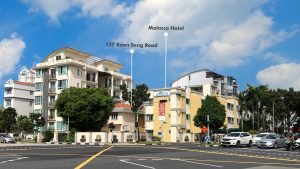The two adjoining freehold sites – a boutique hotel and a residential block at 97 & 99 Still Road and 137 Koon Seng Road – is for sale at a combined guide price of $21 million

image: CBRE
CBRE announced today that it is launching for sale two adjoining freehold sites with addresses at 97 & 99 Still Road and 137 Koon Seng Road. As the exclusive marketing agent for the sale two adjoining freehold sites, CBRE is conducting the sale via a tender process. Ii invited interested parties to submit their offers to CBRE by 24 March 2021 at 3pm.
97 & 99 Still Road seats Malacca Hotel, a three-storey boutique hotel with 29 rooms, while 137 Koon Seng Road accommodates a two-storey residential block that is used as a workers’ quarters and for administrative purposes for the Hotel’s operations.
Strategically located at the junction of Still Road and Koon Seng Road, the two adjoining freehold sites enjoy high visibility.
The two adjoining freehold sites have a total site area of approximately 14,661 square feet and are to be sold as a bundle.
Under URA’s Master Plan 2019, both sites are zoned for “Residential” use with a plot ratio of 1.4. The guide price for the two adjoining freehold sites is S$21 million. This works out to be approximately S$960 per square foot per plot ratio, subject to confirmation of development charges payable on combination of the two sites.
The immediate vicinity comprises a vibrant mix of colorful Peranakan shophouses, high-rise condominiums and landed housing enclaves, as well as numerous restaurants, bars and hipster cafes. The Katong/Joo Chiat locale will be invigorated and witness improved accessibility with the upcoming Marine Parade MRT station on the Thomson-East Coast Line by 2023.
Mr Teo Junrong, Associate Director of CBRE Hotels, says, “The subject property presents a rare but timely opportunity for investors to capitalize on the Katong/Joo Chiat’s rejuvenation, as accommodation assets in this part of Singapore have been tightly held over the years.
“We are optimistic of the site’s attractiveness, as initial enquiries with URA indicated that there will be minimal development charges, which will be a huge plus point for developers seeking to increase or replenish their landbank. Investors can consider either to retain the current use or to redevelop the site to accommodate a boutique residential non-landed development. There is also the option of turning the site into a unique co-living product with a mix of short-stay and long-stay accommodation,” shares Mr Teo.
A 15-minute drive to both Orchard Road and the Central Business District, the subject property’s immediate vicinity comprises conservation terraces houses and landed housing. Nearby educational institutions include CHIJ Katong Primary and Tao Nan School. The two adjoining freehold sites enjoys connectivity to the rest of the island via major trunk roads, the East Coast Parkway (ECP) and Pan-Island Expressway (PIE).
Mr Paul Ho, chief mortgage officer at iCompareLoan, said: “The global economic outlook is expected to remain subdued in the near term given the ongoing uncertainty and risks of new waves of COVID-19.”
He added: “I am confident that the hospitality industry will rebound sharply after the vaccine becomes widely available by the end of 2021. Combined with TraceTogether, it could allow for some optimism and the return to at least a 70% travel economy starting mid-2021. When international travel without quarantine returns with the World Economic Forum which will convene the Special Annual Meeting 2021 in Singapore from 25-28 May, the industry’s legacy of resilience and agility will be seen.”
Mr Ho suggested, “Since this is the downtime for most hoteliers, they should take this opportunity to review their business strategies and position themselves for the eventual upturn.”
He added, “What they should do is, develop a pricing strategy to make their hotel more attractive once demands returns. Pricing room rates competitively is important as rooms priced lower would mean a slower hotel recovery for the real estate owners and investors.”
In an earlier report, Colliers said that as markets start to recover, consumers will prioritise health, safety and hygiene when it comes to travel planning and decision making. Personal space will also be more important; instead of large tour groups, independent travel will take precedence and people will likely prefer bespoke holidays and seek out travel experiences with a purpose (such as health and wellness, eco-travel, etc.).
Technology will also take on a more critical role in the traveler ecosystem and be a key tool in the revival of travel. Robots, chatbots, automation, recognition technology, artificial intelligence (AI), internet of things (IoT) and virtual reality (VR) will become increasingly commonplace.
Although there is a wide variety of accommodation options in the East, there is still a gap for a boutique lifestyle brand that can cater to the aspiring new travelers who are willing to pay a premium for the product and location. With a well-thought-out concept, renovation and repositioning plan, The Malacca Hotel can fill this gap and capture the targeted segment.
Mr Ho said, “Malacca Hotel is in a strategic location but it is unclear if hotel sector’s recovery will make a strong rebound after the circuit breaker period. Since this is the downtime for most hoteliers, they should take this opportunity to review their business strategies and position themselves for the eventual upturn.”
He added, “What they should do is, develop a pricing strategy to make their hotel more attractive once demands returns. Pricing room rates competitively is important as rooms priced lower would mean a slower hotel recovery for the real estate owners and investors.”
The post Two adjoining freehold sites in the East for sale by tender appeared first on iCompareLoan Resources.

